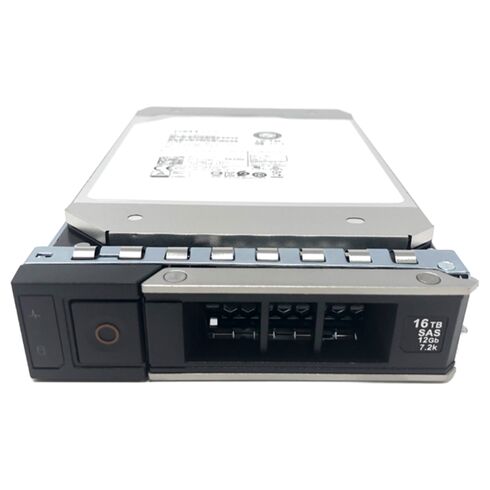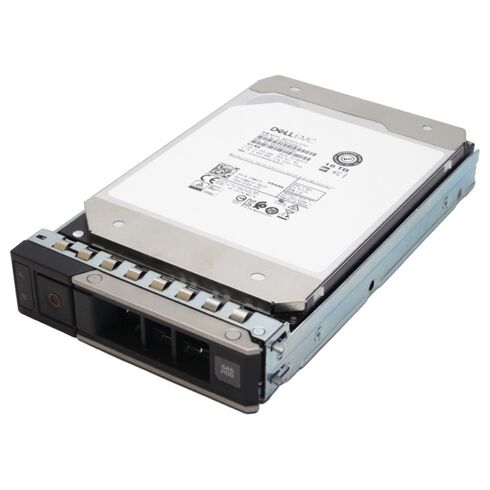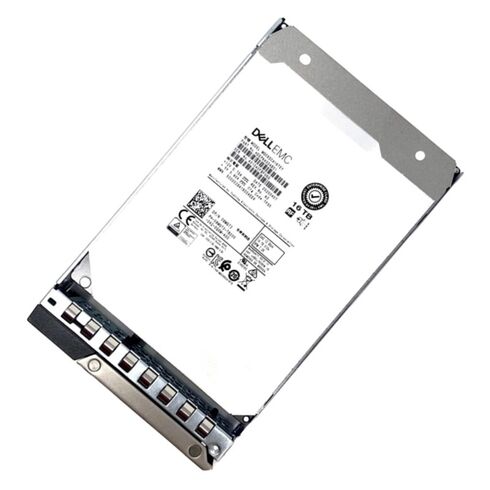400-BHIV Dell 16TB 7.2K RPM SAS 12GBPS 512E LFF HDD
- — Free Ground Shipping
- — Min. 6-month Replacement Warranty
- — Genuine/Authentic Products
- — Easy Return and Exchange
- — Different Payment Methods
- — Best Price
- — We Guarantee Price Matching
- — Tax-Exempt Facilities
- — 24/7 Live Chat, Phone Support
- — Visa, MasterCard, Discover, and Amex
- — JCB, Diners Club, UnionPay
- — PayPal, ACH/Bank Transfer (11% Off)
- — Apple Pay, Amazon Pay, Google Pay
- — Buy Now, Pay Later - Affirm, Afterpay
- — GOV/EDU/Institutions PO's Accepted
- — Invoices
- — Deliver Anywhere
- — Express Delivery in the USA and Worldwide
- — Ship to -APO -FPO
- — For USA - Free Ground Shipping
- — Worldwide - from $30
Product Details
General Information
- Manufacturer: Dell
- Part Number: 400-BHIV
- Type of Product: Hard Disk Drive with Tray
Technical Specifications
Storage Capacity and Form Factor
- Total Capacity: 16TB
- Form Factor Size: 3.5 inches
- Interface Technology: SAS 12Gbps
- Sector Size: 512e
Performance Metrics
Speed and Efficiency
- Spindle Rotation Speed: 7200 RPM
- Average Access Time: 4.16 ms
- Maximum Sustained Data Transfer Rate: Up to 261,249 Mbps
- External Drive Transfer Rate: 1200 Mbps
- Cache Size: 256 MB
Expansion and Connectivity Options
Interface and Bay Compatibility
- Interface Ports: 1 x SAS 12Gbps
- Supported Bays: 1 x Hot-plug - 3.5 inches
Compatibility Overview
Supported Dell PowerEdge Models
This hard disk drive is designed to be compatible with a variety of Dell PowerEdge servers:
- PowerEdge C6420
- PowerEdge R240
- PowerEdge R340
- PowerEdge R440
- PowerEdge R540
- PowerEdge R640
- PowerEdge R6415
- PowerEdge R740
- PowerEdge R740xd
- PowerEdge R740xd2
- PowerEdge R7415
- PowerEdge R7425
- PowerVault NX3240
- PowerVault NX440
Capacity
The Dell 16TB 7.2K RPM SAS 12GBPS 512E LFF HDD offers an impressive storage capacity of 16TB. This massive amount of storage space allows users to store and access a vast amount of data, making it ideal for businesses and individuals with high storage needs.
Benefits of 16TB Capacity
1. Ample Storage Space: With 16TB, users can store large amounts of data, including documents, images, videos, and databases. This is particularly useful for businesses that generate a significant amount of data or require long-term data retention.
2. Flexibility in Data Management: The large capacity allows users to consolidate their data onto a single drive, reducing the need for multiple drives and simplifying data management. It also provides the flexibility to store different types of data without worrying about running out of space.
3. Enhanced Performance: With more storage capacity, users can avoid performance issues caused by running out of space. The Dell 16TB HDD ensures that there is ample room for growth and prevents the drive from reaching its maximum capacity, which can lead to performance degradation.
Importance of 16TB Capacity
1. Scalability: The ability to store up to 16TB of data ensures that users can accommodate their growing storage needs. This scalability is essential for businesses that anticipate expanding their operations or individuals who deal with large files on a regular basis.
2. Cost Efficiency: By offering a large storage capacity, the Dell 16TB HDD eliminates the need for additional drives and reduces the associated costs. Users can save money by investing in a single high-capacity drive instead of purchasing multiple lower-capacity drives.
3. Data Backup and Archiving: The 16TB capacity is especially valuable for backup and archiving purposes. It enables users to create comprehensive backups of their critical data or store large archives without the need for multiple drives. This ensures data integrity and facilitates disaster recovery processes.
Considerations for 16TB Capacity
1. Compatibility: It is important to ensure that the 16TB HDD is compatible with the system or device you intend to use it with. Check the system requirements and verify that it supports drives of this capacity.
2. Data Redundancy: While the 16TB capacity provides ample storage, it is crucial to implement a robust data redundancy strategy. This can include regular backups, mirroring, or RAID configurations to protect against data loss in case of drive failure.
3. Performance Requirements: Depending on your specific use case, consider the performance requirements of your storage solution. While the 16TB capacity is impressive, it is important to ensure that the drive can handle the required read and write speeds for your applications.
Speed
The Dell 16TB 7.2K RPM SAS 12GBPS 512E LFF HDD boasts a speed of 7.2K RPM (rotations per minute). This speed plays a crucial role in determining the performance and responsiveness of the drive.
Benefits of 7.2K RPM Speed
1. Faster Data Access: The higher rotational speed of 7.2K RPM enables faster data access compared to slower RPM drives. This translates into quicker file transfers, reduced loading times, and improved overall system responsiveness.
2. Smooth Multitasking: With a faster rotational speed, the drive can handle multiple read and write requests simultaneously, making it suitable for multitasking scenarios. Users can perform various tasks without experiencing significant performance bottlenecks.
3. Enhanced Performance: The increased speed contributes to improved performance in applications that require quick data retrieval, such as video editing, gaming, or database management. It ensures smooth and uninterrupted data flow, minimizing latency and increasing productivity.
Importance of 7.2K RPM Speed
1. Performance Optimization: The 7.2K RPM speed is crucial for optimizing the performance of storage-intensive applications. It ensures that data can be quickly accessed and processed, reducing potential bottlenecks and improving overall system performance.
2. Compatibility: The 7.2K RPM speed is a widely supported standard, making it compatible with a range of systems and devices. This ensures that the Dell 16TB HDD can be seamlessly integrated into existing infrastructure without compatibility issues.
3. Reliability: Higher rotational speeds often result in better reliability due to improved cooling and reduced vibration. The Dell 16TB HDD's 7.2K RPM speed contributes to its durability, ensuring that it can withstand demanding workloads and extended usage.
Considerations for 7.2K RPM Speed
1. Noise and Power Consumption: Higher rotational speeds can lead to increased noise levels and power consumption compared to slower RPM drives. Consider these factors if noise or energy efficiency is a concern in your specific use case.
2. Application Requirements: Evaluate the specific requirements of your applications or workloads to determine if the 7.2K RPM speed is sufficient. Some applications may benefit from even higher rotational speeds or alternative storage solutions, depending on their demands.
3. Heat Dissipation: The increased rotational speed generates more heat, which needs to be effectively dissipated to maintain optimal drive performance and longevity. Ensure proper cooling measures are in place to prevent overheating and potential performance degradation.
Interface
The Dell 16TB 7.2K RPM SAS 12GBPS 512E LFF HDD features a SAS (Serial Attached SCSI) interface with a data transfer rate of 12Gbps (gigabits per second). The interface plays a crucial role in connecting the drive to the system and facilitating high-speed data transfer.
Benefits of SAS 12GBPS Interface
1. Fast Data Transfer: The 12Gbps data transfer rate provided by the SAS interface allows for rapid and efficient data transfer between the drive and the system. This high-speed interface ensures minimal latency and maximizes overall system performance.
2. Scalability and Compatibility: SAS interfaces are known for their scalability and backward compatibility. The Dell 16TB HDD's SAS 12GBPS interface allows for seamless integration into existing systems and ensures compatibility with a wide range of SAS-enabled devices.
3. Reliability and Redundancy: SAS interfaces are designed with enterprise-level reliability in mind. They offer features such as error detection, error correction, and redundancy to ensure data integrity and minimize the risk of data loss or corruption.
Importance of SAS 12GBPS Interface
1. Enterprise-Grade Performance: The SAS 12GBPS interface is commonly used in enterprise environments where high-performance storage is crucial. It allows for fast data access and supports demanding workloads, making it suitable for mission-critical applications.
2. Scalable Storage Solutions: The SAS interface's scalability enables users to expand their storage capacity by adding additional drives or connecting to external storage enclosures. This flexibility is particularly valuable for businesses that anticipate future growth or require large-scale storage solutions.
3. RAID Configurations: SAS interfaces are often used in conjunction with RAID (Redundant Array of Independent Disks) configurations, which provide data redundancy, fault tolerance, and improved performance. The Dell 16TB HDD's SAS 12GBPS interface allows for seamless integration into RAID arrays, enhancing data protection and performance.
Considerations for SAS 12GBPS Interface
1. Compatibility: Ensure that your system or device supports the SAS 12GBPS interface. Check the specifications and compatibility requirements to ensure seamless integration and optimal performance.
2. Cable Length and Quality: The SAS interface is sensitive to cable length and quality. Ensure that you use high-quality SAS cables of appropriate length to maintain signal integrity and prevent data transmission issues.
3. Controller Requirements: Depending on your system or device, you may need a compatible SAS controller to connect and utilize the full potential of the SAS 12GBPS interface. Verify the controller requirements and compatibility before purchasing the Dell 16TB HDD.
Form Factor
The Dell 16TB 7.2K RPM SAS 12GBPS 512E LFF HDD features a Large Form Factor (LFF). The form factor refers to the physical dimensions and shape of the drive, which determines its compatibility with different systems and enclosures.
Benefits of LFF Form Factor
1. Easy Installation: The LFF form factor is commonly used in standard desktop computers, workstations, and servers, making it easy to install the Dell 16TB HDD into existing systems or enclosures. The drive can be quickly inserted into compatible drive bays without any additional modifications.
2. Improved Cooling: The larger physical size of LFF drives allows for better airflow within the system or enclosure, resulting in improved cooling efficiency. This helps in maintaining optimal drive temperatures and prolonging the drive's lifespan.
3. Higher Capacity Options: LFF form factor drives generally offer higher storage capacities compared to smaller form factors such as Small Form Factor (SFF). By choosing an LFF drive like the Dell 16TB HDD, users can benefit from increased storage capacity without sacrificing compatibility or ease of installation.
Importance of LFF Form Factor
1. Compatibility: The LFF form factor is widely supported in various systems, making it compatible with a range of desktops, workstations, and servers. It ensures a seamless integration process without the need for additional modifications or adapters.
2. Future Expandability: The LFF form factor provides ample space for future expansion. Users can easily add more LFF drives to their systems or enclosures to increase their storage capacity as their needs grow.
3. Flexibility in Drive Selection: The LFF form factor supports a wide range of drive options, allowing users to choose the drive that best suits their requirements in terms of performance, capacity, and cost. This flexibility enables users to optimize their storage solutions according to their specific needs.
Considerations for LFF Form Factor
1. Space Requirements: The LFF form factor drives are physically larger than smaller form factors. Ensure that you have sufficient space in your system or enclosure to accommodate the Dell 16TB HDD or any additional LFF drives you plan to install.
2. Power Consumption: Larger form factor drives generally consume more power compared to smaller form factors. Consider the power requirements of your system or enclosure and ensure that it can provide sufficient power for the Dell 16TB HDD.
3. Enclosure Compatibility: If you plan to use the Dell 16TB HDD in an external enclosure, verify that the enclosure supports LFF drives and is compatible with your intended use case. Check the enclosure specifications and compatibility requirements before making a purchase.
Part Number
The Dell 16TB 7.2K RPM SAS 12GBPS 512E LFF HDD has a part number of 400-BHIV. The part number serves as a unique identifier for the specific product variant, allowing users to easily identify and procure the correct model.
Benefits of Part Number
1. Product Identification: The part number helps users accurately identify and locate the specific product they require. It streamlines the purchasing process by ensuring that users select the correct model and avoid any potential compatibility issues.
2. Warranty and Support: The part number is often used to register products for warranty and support purposes. It enables users to access the appropriate documentation, firmware updates, and technical support specific to their model.
3. Ease of Reordering: If users need to reorder the Dell 16TB HDD or request a replacement, the part number simplifies the process. By providing the part number, users can ensure that they receive the exact same model they previously purchased, guaranteeing compatibility and consistency.
Importance of Part Number
1. Compatibility Assurance: The part number acts as a reliable reference for compatibility. By using the correct part number, users can be confident that they are selecting a compatible drive for their system or enclosure, avoiding any potential issues or incompatibilities.
2. Efficient Maintenance and Upgrades: The part number makes it easier to track and manage multiple drives in a system or infrastructure. It simplifies maintenance tasks such as identifying failed drives for replacement or upgrading existing drives with newer models.
3. Standardization: Part numbers are used across various vendors and manufacturers to ensure standardization in product identification. This allows users to compare similar products from different sources based on their part numbers, making it easier to find the best options for their specific needs.
Considerations for Part Number
1. Model Variants: Ensure that you are selecting the correct variant of the Dell 16TB HDD based on its part number. Different variants may have slight differences in specifications or compatibility, so double-check the part number before making a purchase.
2. Authenticity: When purchasing the Dell 16TB HDD based on its part number, ensure that you are buying from authorized retailers or trusted sources to guarantee authenticity. Counterfeit or unauthorized products may have similar part numbers but could differ in quality or performance.
3. Documentation Verification: Use the part number to cross-reference the product documentation provided by Dell to ensure that you have the correct information for your specific model. Verify that the documentation matches the part number and its associated specifications, features, and compatibility information.













